
Is the 'Ron Paul Effect' for Real?
If you hang out online much (and if you're reading this, chances are you do), you've no doubt noticed the seeming onslaught of fevered, near-rabid support for Republican presidential candidate, Ron Paul. The Paul campaign seems to get a ton of mention online. In fact, even the mainstream media is finally acknowledging--albeit in a very suspicious manner--the apparent surge of grassroots support for "Dr. No," as he's sometimes called. ABC News, among others, did a high-profile story about the "Ron Paul Effect" and looked into whether or not the apparent surge in online support for this dark horse candidate could lead to a reciprocal increase in offline support and coverage.
I decided to look at some numbers to get an idea of how real this swell of Ron Paul support is, both online and off. Is Ron Paul gaining a huge show of support from all across the spectrum, or does he just have a small but loyal (and web savvy) following that's beaten all of the other candidates to the concept of viral politics?
Stories about Ron Paul in the Reddit Hot 50 at the time of this writing: 7
Stories about Ron Paul in the Digg Top 50 at the time of this writing: 0*
*(Apparently some of the users at Reddit claim that Digg is automatically burying anything having to do with Ron Paul.)
If you browse Reddit with any frequency, you know that you can't close your eyes and point without hitting a post extolling the virtues and statistical triumphs (fund raising accomplishments, online debate poll victories) of Ron Paul. As online marketers, we all know the value, in attention and links, of getting a story on the front page of Digg or Reddit. In the realm of politics though, how is this attention carrying over across the web?
.jpg)
Looking at Google Trends data, Paul has definitely seen a significant increase in search volume, with apparent spikes around Republican debates (starting with the May 4th debate in California). Rudy Giuliani, one of the Republican front-runners, barely has a pulse online according to this chart, while Democratic leaders Hillary Clinton and Barack Obama have remained rather close all year.
This would seem to indicate that there's been broad interest in Paul, steadily increasing after a huge spike to prominence following the May debate. But before we jump to any conclusions, let's look at some other indicators.
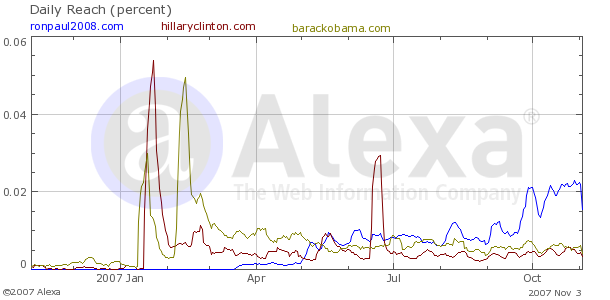
Alexa data seems to mirror Google almost identically: a steady climb, eventually beating the Democratic candidates, beginning in May.
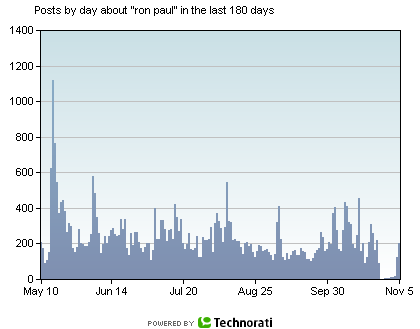
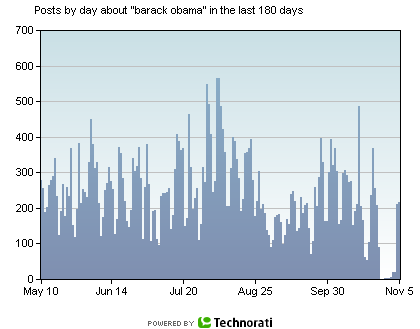
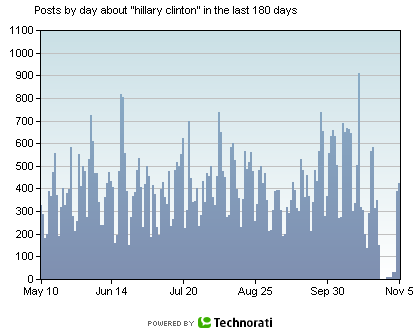
A few spikes aside, Technorati indicates that, since May, Ron Paul has, on average, been receiving slightly less blog coverage than Obama and quite a bit less than Clinton (note the Y-axis; these graphs are not in the same scale).
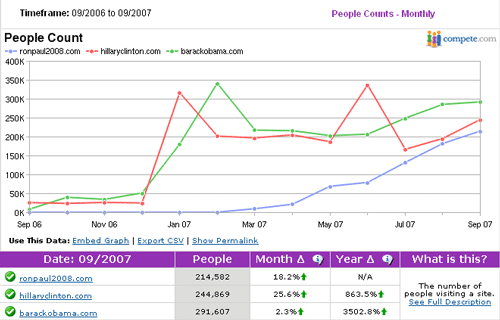
And lastly, according to Compete.com, which uses a variety of sources to derive its usage data, Paul has, you guessed it, been steadily gaining since May, but hasn't caught Clinton or Obama.
So, what does this all mean? Well, it's hard to say. The numbers above could indicate several things:
The stories of record fund raising accomplishments, growing support, domination in post-debate polling, and even improving odds among Las Vegas bookmakers seem to indicate that the Ron Paul e-juggernaut may be on the verge of becoming a real boy. But there's a disconnect. In actual, in-person, scientific polling, Ron Paul barely registers. In Gallup polls taken since March of 2007, Ron Paul has only received 1-3% from likely voters (3% in April, after the California debate attention spike, but back down to 2% by October), putting him near the back of the GOP pack. In the recent Ames Straw Poll in Iowa, Congressman Paul took 9.1% of the vote, placing him 7th; far from the lead (Mitt Romney), but ahead of better funded and less-fringe (depending on your views) candidates such as Duncan Hunter and Tom Tancredo.
Is Ron Paul having difficulty reaching a mainstream, less web-savvy audience? Perhaps. Polling in early primary states shows Paul as barely a blip on voters' radar...not a death sentence, but certainly a difficult hurdle (witness the meltdown of the Howard Dean campaign after a few early primary losses, then remember that Paul is a Republican, where polls tend to be far more indicative of actual results). Paul's campaign, now flush with online fund raising capital, finally prepared and launched television ads last week...in New Hampshire, the fifth state in the Republican primary schedule. This unfortunately means that Dr. Paul's efforts at a serious offline, mainstream media campaign are targeting a possible primary showing almost three weeks (and four well-publicized primaries) after the Iowa caucus, and only two weeks before Super Tuesday. These are some ambitious deadlines, to say the least.
While Ron Paul's stellar rise to internet stardom and his amazing fund raising numbers from online efforts, thanks in large part to the seemingly relentless efforts of the Paulites, will likely join the 2004 Dean campaign as the playbook for online campaigning, it may be too late to transition that momentum into real poll numbers. Unfortunately, if Ron Paul doesn't do well in primaries, many pundits will likely say it's proof that non-scientific polls were rigged, and the "Ron Paul Revolution" was mostly smoke and mirrors from a small group of fanatical but savvy followers. National marketing campaigns cannot live online alone.
Web-based ad campaigns may represent some of the best ROI for your marketing buck, but for a campaign of the necessary scope and breadth of a presidential bid, mainstream media, particularly television, is a proven and seemingly necessary component. That may change one day, and campaigns like that of Dr. Paul are leading the way, demonstrating that the internet can reach a passionate, motivated portion of the electorate that will speak loudly and give generously. But whether Ron Paul is the candidate that can take that online momentum and transform it into a serious bid for the White House remains to be seen.
NOTE FROM RAND: For anyone who wants it, here's the comparative data from blog & news search sources as well.
Google Blog Search results:
p.s. As with all SEOmoz posts that touch on politics, please limit the comments to the subjects of Internet Marketing and SEO - there's lots of other places on the web to discuss the political implications of Paul and company.
I decided to look at some numbers to get an idea of how real this swell of Ron Paul support is, both online and off. Is Ron Paul gaining a huge show of support from all across the spectrum, or does he just have a small but loyal (and web savvy) following that's beaten all of the other candidates to the concept of viral politics?
Stories about Ron Paul in the Reddit Hot 50 at the time of this writing: 7
Stories about Ron Paul in the Digg Top 50 at the time of this writing: 0*
*(Apparently some of the users at Reddit claim that Digg is automatically burying anything having to do with Ron Paul.)
If you browse Reddit with any frequency, you know that you can't close your eyes and point without hitting a post extolling the virtues and statistical triumphs (fund raising accomplishments, online debate poll victories) of Ron Paul. As online marketers, we all know the value, in attention and links, of getting a story on the front page of Digg or Reddit. In the realm of politics though, how is this attention carrying over across the web?
.jpg)
Looking at Google Trends data, Paul has definitely seen a significant increase in search volume, with apparent spikes around Republican debates (starting with the May 4th debate in California). Rudy Giuliani, one of the Republican front-runners, barely has a pulse online according to this chart, while Democratic leaders Hillary Clinton and Barack Obama have remained rather close all year.
This would seem to indicate that there's been broad interest in Paul, steadily increasing after a huge spike to prominence following the May debate. But before we jump to any conclusions, let's look at some other indicators.

Alexa data seems to mirror Google almost identically: a steady climb, eventually beating the Democratic candidates, beginning in May.



A few spikes aside, Technorati indicates that, since May, Ron Paul has, on average, been receiving slightly less blog coverage than Obama and quite a bit less than Clinton (note the Y-axis; these graphs are not in the same scale).

And lastly, according to Compete.com, which uses a variety of sources to derive its usage data, Paul has, you guessed it, been steadily gaining since May, but hasn't caught Clinton or Obama.
So, what does this all mean? Well, it's hard to say. The numbers above could indicate several things:
- Ron Paul's performance in debates and other media coverage has garnered increasing interest from the public, now approaching the levels of DNC front-runners Clinton and Obama.
- Ron Paul's loyal support base (Paulites) have strategically managed to create a successful viral campaign for their candidate that has made him an online darling and grabbed him a lot of attention.
- Fox News and others are right that Paulites haven't gone viral, they're just spamming the crap out of every forum, poll, comment thread, and social media portal they can find.
The stories of record fund raising accomplishments, growing support, domination in post-debate polling, and even improving odds among Las Vegas bookmakers seem to indicate that the Ron Paul e-juggernaut may be on the verge of becoming a real boy. But there's a disconnect. In actual, in-person, scientific polling, Ron Paul barely registers. In Gallup polls taken since March of 2007, Ron Paul has only received 1-3% from likely voters (3% in April, after the California debate attention spike, but back down to 2% by October), putting him near the back of the GOP pack. In the recent Ames Straw Poll in Iowa, Congressman Paul took 9.1% of the vote, placing him 7th; far from the lead (Mitt Romney), but ahead of better funded and less-fringe (depending on your views) candidates such as Duncan Hunter and Tom Tancredo.
Is Ron Paul having difficulty reaching a mainstream, less web-savvy audience? Perhaps. Polling in early primary states shows Paul as barely a blip on voters' radar...not a death sentence, but certainly a difficult hurdle (witness the meltdown of the Howard Dean campaign after a few early primary losses, then remember that Paul is a Republican, where polls tend to be far more indicative of actual results). Paul's campaign, now flush with online fund raising capital, finally prepared and launched television ads last week...in New Hampshire, the fifth state in the Republican primary schedule. This unfortunately means that Dr. Paul's efforts at a serious offline, mainstream media campaign are targeting a possible primary showing almost three weeks (and four well-publicized primaries) after the Iowa caucus, and only two weeks before Super Tuesday. These are some ambitious deadlines, to say the least.
While Ron Paul's stellar rise to internet stardom and his amazing fund raising numbers from online efforts, thanks in large part to the seemingly relentless efforts of the Paulites, will likely join the 2004 Dean campaign as the playbook for online campaigning, it may be too late to transition that momentum into real poll numbers. Unfortunately, if Ron Paul doesn't do well in primaries, many pundits will likely say it's proof that non-scientific polls were rigged, and the "Ron Paul Revolution" was mostly smoke and mirrors from a small group of fanatical but savvy followers. National marketing campaigns cannot live online alone.
Web-based ad campaigns may represent some of the best ROI for your marketing buck, but for a campaign of the necessary scope and breadth of a presidential bid, mainstream media, particularly television, is a proven and seemingly necessary component. That may change one day, and campaigns like that of Dr. Paul are leading the way, demonstrating that the internet can reach a passionate, motivated portion of the electorate that will speak loudly and give generously. But whether Ron Paul is the candidate that can take that online momentum and transform it into a serious bid for the White House remains to be seen.
NOTE FROM RAND: For anyone who wants it, here's the comparative data from blog & news search sources as well.
Google Blog Search results:
- 59,364 for Ron Paul
- 93,384 for Hillary Clinton
- 67,199 for Barack Obama
- 46,714 for Rudy Giuliani
- Another 4,570 for Rudolph Giuliani
- 43,139 for Mitt Romney
- 5,333 for Ron Paul
- 23,708 for Hillary Clinton
- 28,476 for Barack Obama
- 21,411 for Rudy Giuliani
- Another 663 for Rudolph Giuliani
- 19,480 for Mitt Romney
p.s. As with all SEOmoz posts that touch on politics, please limit the comments to the subjects of Internet Marketing and SEO - there's lots of other places on the web to discuss the political implications of Paul and company.
The author's views are entirely their own (excluding the unlikely event of hypnosis) and may not always reflect the views of Moz.


![Convince Your Boss to Send You to MozCon 2025 [Plus Bonus Letter Template]](https://moz.rankious.com/_moz/images/blog/banners/eee4a4a8-d4aa-457e-80b1-0ffa186b88ff_2025-06-27-174747_coli.png?w=580&h=196&auto=compress%2Cformat&fit=crop&dm=1751046467&s=454333def17ba9d472d3d98b6786741e)

Comments
Please keep your comments TAGFEE by following the community etiquette
Comments are closed. Got a burning question? Head to our Q&A section to start a new conversation.